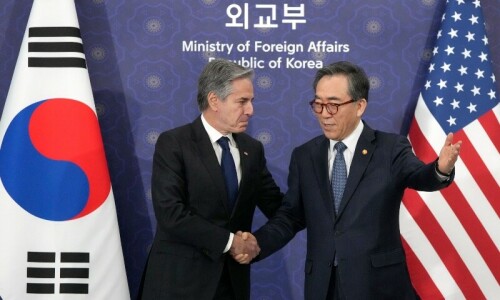MUMBAI: A rare Bollywood movie tackling homophobia gets its Indian premiere on Friday, with the film-makers hoping it will help change attitudes in the conservative country where homosexuality is illegal.
Aligarh is based on a true story about a university professor who was suspended from his post after a television news crew filmed him having sex with a rickshaw puller in an undercover sting operation.
“The film deals with a human story about a man isolated by his peers for a choice that should have been his own,” the film’s director, Hansal Mehta, explained to AFP.
“I hope Aligarh will poke people’s conscience and make them look at their own prejudices,” he added.
Shrinivas Ramchandra Siras, then 64, was teaching at Aligarh Muslim University (AMU) in the northern Indian state of Uttar Pradesh in February 2010 when his private life made news headlines.
Siras, who was also an award-winning poet, was suspended and briefly fought to be reinstated, but was found dead in his apartment in suspicious circumstances two months later.
Traces of poison were discovered in his body and police initially suspected suicide, but they later made several arrests, although no one was convicted and the case was ultimately dropped.
Media reports at the time alleged the university had ordered the sting to hound Siras out. AMU denied it was involved.
Aligarh, which stars Manoj Bajpayee as Siras and Rajkummar Rao as a journalist who befriends him, opens the 17th edition of the Mumbai Film Festival after showings in London and South Korea’s Busan.
Censor hurdle to come
The Hindi-language movie is unusual in that it shines a spotlight on attitudes towards homosexuals in socially-conservative India where Bollywood movies often ridicule gay characters and portray them as being extremely camp.
“Very few films tackle the subject head on,” the writer and editor of Aligarh, said Apurva Asrani.
“Either they pussyfoot around it, insinuating a character’s sexuality but never quite confronting it, or make a mockery of it,” he added.
The film is due for general release in India early next year, but before it hits screens nationwide the film must pass India’s notoriously strict censor board.
The hounding of Siras came during a brief period in Indian history when homosexuality was actually legal.
The Delhi High Court had decriminalised the colonial-era ban on homosexuality in 2009, only for the Supreme Court to restore it in 2013, stunning rights campaigners and the gay and lesbian community.
“The law was actually in favour of same sex. In spite of this, a 64-year-old scholar was harangued and shamed till his death,” said Asrani.
“Can you imagine the state of Siras in today’s context? Where does a man go for justice? And what of all those people who came out in 2009? Can they go back into hiding now?” he added.
Anyone found guilty of same-sex activity can face life imprisonment or up to 10 years in jail and a fine under the controversial Section 377 of India’s penal code.
Right to privacy
Although prosecutions have been rare, the gay community says it faces significant discrimination as well as harassment and blackmail from police in India.
Surveys show broad disapproval of homosexuality in India, forcing many gay men and women to live double lives.
“The law and society’s attitudes reinforce each other in a negative way,” said Nitin Karani, a Mumbai-based gay rights activist.
“If you live in a small town you have few choices to escape from the brunt of being harassed by the police, or society, or even your own family members.
“Hopefully the film will put a spotlight on Section 377,” he added.
Asrani said Aligarh was as much about an individual’s right to privacy as it is about treating everybody the same.
“A man who wishes to keep his sexual identity concealed has every right to do so,” he said.
“We must understand that the brave activists and gay men who have come out have done so based on their own internal reserves of courage, of their support structures, environment, etc.”
Aligarh must still pass India’s censor board before its general release.
Earlier this year the Central Board of Film Certification muted the word “lesbian” from a Hindi language film and blocked the release of Fifty Shades of Grey.
But Asrani remains unperturbed.
“Aligarh is an honest film. There is no effort to titillate or provoke,” he said.
Published in Dawn, October 31st, 2015
On a mobile phone? Get the Dawn Mobile App: Apple Store | Google Play









































Dear visitor, the comments section is undergoing an overhaul and will return soon.